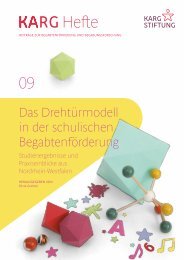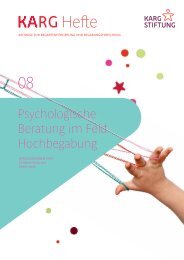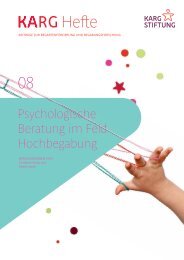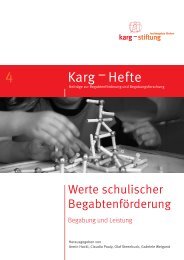FAQS: Frequently asked questions about giftedness
The Karg Foundation receives a lot of questions on the subject of giftedness—FAQs (Frequently Asked Questions)—far more often indeed than it did ten years ago. And this is a good thing! Many people involved in the educational processes of children have come to realize that giftedness can also be a fundamental personality trait of children and adolescents. The Karg Foundation wants to answer the questions you may have not only as educational and psychological professionals in educational institutions or working as educational providers, policy makers, or in training and further education institutes, but as parents and gifted people also: What is giftedness? How can it be identified? Who can provide advise for gifted children and their families? How can they be supported in the best possible way?
The Karg Foundation receives a lot of questions on the subject of giftedness—FAQs (Frequently Asked Questions)—far more often indeed than it did ten years ago. And this is a good thing! Many people involved in the educational processes of children have come to realize that giftedness can also be a fundamental personality trait of children and adolescents.
The Karg Foundation wants to answer the questions you may have not only as educational and psychological professionals in educational institutions or working as educational providers, policy makers, or in training and further education institutes, but as parents and gifted people also: What is giftedness? How can it be identified? Who can provide advise for gifted children and their families? How can they be supported in the best possible way?
You also want an ePaper? Increase the reach of your titles
YUMPU automatically turns print PDFs into web optimized ePapers that Google loves.
What are the concerns that<br />
commonly motivate parents<br />
to seek guidance?<br />
While <strong>giftedness</strong> is not necessarily associated with<br />
specific problems, people do seek out counseling services<br />
that specialize in this topic, and they do so for a wide<br />
variety of reasons. Most frequently, it is parents who are<br />
seeking advice, but also the children and adolescents<br />
themselves and the teaching professionals at schools and<br />
Kitas make use of counseling services.<br />
Counseling does not always have to address specific<br />
problems, it can also be used to prevent them. Parents and<br />
educators are often looking for sound information on the<br />
topic of <strong>giftedness</strong> as well as on the possibilities of school<br />
and extracurricular support.<br />
However, very many requests for consultations are<br />
also motivated by a specific diagnostic concern. In many<br />
cases, whether or not a child is actually gifted is not the<br />
only question that is raised. Rather, there are specific<br />
problems or decisions to be made that prompt a desire<br />
for educational assessment, such as issues of academic<br />
underachievement or overachievement, or making school<br />
career adjustments by skipping a grade or changing schools.<br />
The guidance accompanying the diagnostic process then<br />
aims to provide information and assistance based on the<br />
specific individual circumstances.<br />
Sometimes children, adolescents, or their parents are<br />
also troubled by more serious concerns. These include, for<br />
example, conflicts in the family, with teachers, or with<br />
fellow classmates, prolonged learning and achievement<br />
problems, or adverse emotional states. Counseling provides<br />
support in coping with these specific problems.<br />
52<br />
53
















